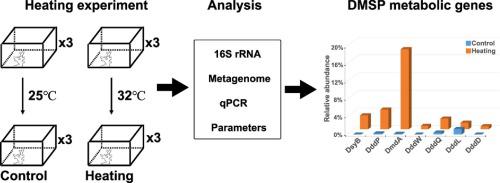Ecological Indicators ( IF 6.9 ) Pub Date : 2022-04-22 , DOI: 10.1016/j.ecolind.2022.108886 Hao Sun 1, 2 , Huina Zheng 3 , Yiwei Jiang 1 , Jinchang Liang 4 , Baolin Liao 1 , Ruixuan Wang 5 , Aihua Li 2 , Baohua Xiao 1, 6

|
The global phenomenon of coral bleaching under thermal stress has been recognized as the primary driver underlying coral reef degradation. The coral bacterial community plays an important role in the stability of coral reef ecosystem. Dimethylsulfoniopropionate (DMSP) and its associated metabolites are essential for the establishment of coral bacterial communities and provide key benefits for overall coral health and bleaching recovery. Substantial research to date has focused on the bacterial community composition, metabolism and functional properties within the coral holobiont, but less attention has been paid to the role of bacteria in seawater surrounding corals under thermal stress. Here, we investigated bacterial community composition, biological functions and DMSP metabolism changes of the seawater surrounding corals under thermal stress. We found that microbial community in seawater surrounding corals changed under thermal stress, and corals bleached eventually. The abundance of Rhodobacterales, Flavobacteriales and Rhizobiales increased while Chitinophagales and SAR11 decreased as temperature elevated. Correspondingly, stress tolerant, biofilm forming and mobile elements increased, resulting in large part from changes in Rhodobacterales and Phaeodactylibacter abundance. DMSP producing and catabolic levels in seawater surrounding corals were enhanced under thermal stress with higher dsyB (1.46-fold), dddP (2.43-fold) and dmdA (1.47-fold) detected. This study reveals the biological functions and metabolisms of bacteria in the water surrounding corals, providing valuable insight on how these communities and functions change in coral reef ecosystem under thermal stress.
中文翻译:

升高的温度改变了珊瑚礁生态系统海水中的细菌群落组成和新陈代谢:Acropora digitifera 漂白实验室实验的证据
全球珊瑚在热应力下的白化现象已被认为是珊瑚礁退化的主要驱动因素。珊瑚细菌群落对珊瑚礁生态系统的稳定起着重要作用。二甲基磺基丙酸酯 (DMSP) 及其相关代谢物对于建立珊瑚细菌群落至关重要,并为整体珊瑚健康和漂白恢复提供关键益处。迄今为止,大量研究集中在珊瑚全生物体内的细菌群落组成、代谢和功能特性上,但对细菌在热应激下珊瑚周围海水中的作用关注较少。在这里,我们研究了热应激下珊瑚周围海水的细菌群落组成、生物功能和 DMSP 代谢变化。我们发现珊瑚周围海水中的微生物群落在热应力下发生了变化,最终珊瑚白化了。随着温度升高,红杆菌目、黄杆菌目和根瘤菌目的丰度增加,而几丁质食菌目和 SAR11 的丰度降低。相应地,抗逆性、生物膜形成和移动元素增加,这在很大程度上是由于红杆菌属和拟杆菌属丰度。在热应力下,珊瑚周围海水中 DMSP 的产生和分解代谢水平增强,检测到更高的dsyB(1.46 倍)、dddP(2.43 倍)和dmdA(1.47 倍)。这项研究揭示了珊瑚周围水中细菌的生物学功能和新陈代谢,为这些群落和功能在热应激下珊瑚礁生态系统中的变化提供了宝贵的见解。



























 京公网安备 11010802027423号
京公网安备 11010802027423号